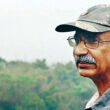The cultural life of the people of Coorg centers on the village and the family. Religious festivals, marriages, births and the three major festivals of Kailpodh, Kaveri sankramana and Puttari(Huttari) are the main events of the lives of the people of the town of Coorg.
There are just a few festivals that the people of Coorg observe with great dedication. Over the years, as more and more influence from Hinduism has become present in the lives of the people of Coorg, there as also been an incursion of the Hindu religion as well.
Here is a list of the main festivals and when the Coorg community celebrates them:
• Ugadi – February
• Shivarati – March
• Kailpold – September
• Kaveri Shankaramana – October
• Puttari – November/December
The Shivaratri and the Ugadi festivals are both primarily of Hindu origin and do not require much of an introduction. However, all of the other festivals are unique in purpose and celebration.
Kailpodh
When the end of the paddy sowing has come to pass and the close of the agricultural working season is near, it is time for the Kailpold festival. This occasion is celebrated with festivities, a great feast and the gathering for games and sports on the village green. The Coorgs set up Coconut Shies, conduct races, and hold marksman competitions. In the past, a time and date would be set and men of the tribe would set out on the hunt for game. Nowadays hunting does not form a part of the celebrations; instead shooting competitions are organized in the villages to satisfy the urge to take the target out.
The people of Coorg have a ballad to commemorate the festival of Kailpold:
“On Kailmurth feast my work is done
Then to the woods with knife and gun
I hunt the bison, tiger, deer
I am a fearless mountaineer”
Kaveri Shankramana
As October arrives, it is time for the biggest festival of all, Kaveri Shankramana. One of the chief festivals of the Kodavas. This time of the year the source of Kaveri River rises. This festival is to mark the renewal of the river Kaveri. The theertha waters rise every year. Traditionally, on the morning of Theerthodbhava Day, the Coorg families get ready for the event by cutting the branches of the Ponge Mara, which the find in the Coorg forests. They slit the sticks on top and tie a few leaves from the Kaiballi, a local vine, around the top of the stick. Then the prepared sticks are set in the ground at different spots all around the house.
Two of the sticks are placed outside of the house, one is placed in the front yard, one in the paddy fields, one in the cattle shed and one near the well.
The next day, early in the morning, the woman of the house gets up and takes a bath. Then she fills a platter with rice and on that, she places three betel nuts, three betel leaves, a cucumber or coconut that has been wrapped in a red silk scarf known as a vastra and a small lamp. This is called the Thaliakki Bolcha and it is placed facing toward the East and the cucumber or coconut is then adorned with the lady’s traditional ornaments such as the Jaumale and the Pathakku. Some bangles made of glass are placed on the rice and the whole platter is then decorated with flowers.
Once the lamp has been lit, the family will gather around and throw rice on the cucumber or coconut to invoke the Goddess Kaveri and ask her to give her blessing by touching the platter and then placing their hands on their foreheads. After this has been completed, the woman touches her husband’s feet and asks for his blessings.
Then, the morning meal, consisting of dosas, is served and then followed by some paisa(kheer) that has been prepared specially for the festival. The Coorgs fill three dosas with sugar and coconut and place them near the sticks that were placed around the house on the previous day. The Kaveri Shankramana is the only Coorg festival at which only vegetarian cuisine is served.
Puttari(Huttari)
The traditional harvest festival of the Coorgs is called Puttari. Late in the month of November or early in December just a few day before it is time for the festival, when the crops are ready for harvest and the moon is full, every village and every family come together and pray to the gods, thanking them for another plentiful year. Then the lady of the house takes a lamp and leads everyone to the fields and the first of the ripe paddy are cut. The sheaves that are cut are tied in little bunches and passed out to the attendants of the festival. The bunches are hung over the threshold or other significant place to ensure prosperity.
The people of Coorg have strong believes and celebrate each of these festivals with passion and commitment just as their ancestors would prefer it.




